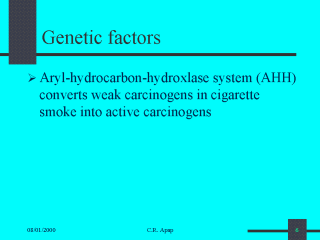|
|
|
|
front |1 |2 |3 |4 |5 |6 |7 |8 |9 |10 |11 |12 |13 |14 |15 |16 |17 |18 |19 |review |
 |
3. Genetic factors:
The enzyme system aryl-hydrocarbon-hydroxylase (AHH) plays an important role in the conversion of weak carcinogens in cigarette-smoke into active carcinogens. McLemore et al showed a strong association between active smoking and the expression of the gene CYP1A1 in normal lung tissue. The product of this gene, a cytochrome P4501A1-dependent monooxygenase, converts the weak carcinogens in cigarette smoke into procarcinogens. Sellers et al described in a study of 337 families that the incidence of lung cancer in smoking males who have a specific gene is higher (42%) than in male smokers without the specific gene (27%), in non-smoking gene-positive carriers (27%), and in non-smoking gene-negative carriers (4%). According to other studies, smokers with enzyme P-45011D6 on chromosome 22 have a higher risk of developing lung cancer. Further development could lead to appropriate investigations to be carried out specifically on people most likely to develop the disease. |